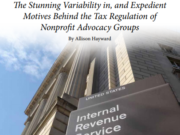Revelations from Congressional investigations into the IRS targeting program last week continue to cast doubt on the veracity of the agency’s narrative that the targeting was perpetrated by “rogue” agents.
According to IRS employee Gary Muthert of the Cincinnati branch, his supervisor explained to him that “Washington, D.C. wanted some cases,” when told to look out for tea-party applications. Specifically, Mr. Muthert was asked to find seven cases for the D.C. office to pursue.
Another employee, Elizabeth Hofacre, said that she turned to D.C. based IRS officials for guidance after tea-party applications were pulled in April 2010. Ms. Hofacre said that she worked closely with IRS lawyer Carter Hull, saying in her interview that:
“I was essentially a front person, because I had no autonomy or no authority to act on [applications] without Carter Hull’s influence or input.”
Ms. Hofacre alleges that Mr. Hull provided direct oversight, and even worked on developing the un-Constitutionally intrusive questionnaires. Now, according to National Review Online, Mr. Hull is retiring.
As damning as the newly revealed details are, the who, when, and why are ultimately ancillary questions. The most important question stemming from the scandal is really how, in a country where the first limit on government enshrined in the Constitution is freedom of political expression, do we have an agency filled with unaccountable bureaucrats with the power to judge what constitutes political expression?













